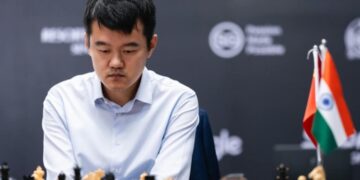Five-time World Chess Champion Vishwanathan Anand, after analyzing the final classical game of the World Chess Championship match between Ding Liren and Gukesh Dommaraju 30 minutes before it ended, said there was a 99.7% chance it would end in a draw. If that happened, the championship would be settled via a tiebreak with a shorter format, in which Liren enjoys a higher rating than Gukesh. Liren also has happy memories of the tiebreak as he was crowned as the World Champion by defeating Russia’s Ian Nepomniachtchi through this tie-break last year.
Anand even mentioned that the position seemed so straightforward that even with less time on the clock, Ding could still defend well. But things took a different course.
What transpired over the next few minutes is a story of determination and grit, the qualities that are just as crucial in chess as aptitude and talent are.
Anyone who followed the 14-game championship would have noticed that world champion often aimed for draws, either by repeating moves (whenever both players repeat the same moves three times in a row, it is considered a draw) or offering easy piece trades. What was the motive behind this? Was it because the Chinese was considered a favourite to win the title in shorter formats? After the penultimate game, Ding even confessed that he had almost given up at a critical juncture when Gukesh had pressed for an advantage.
On the other hand, 18-year-old Gukesh refused any trades that didn’t improve his position. He seized every opportunity to push for an advantage, even in games that seemed deadlocked or likely to end in a draw.
Also Read: Titles and achievements of D Gukesh — the youngest World Chess Champion
After initial jitters had settled down, losing the first game, drawing the second and striking back in the third, Gukesh came into his own.
Here are some instances:
Game 6: Ding with the white pieces offered a draw via repetition despite having a strategically better position than Gukesh. The Indian declined after repeating the moves twice.
Game 8: Even with a slightly worse position, Gukesh once again refused to draw via repetition and tried to squeeze water out of stone. But Ding managed to force a draw after playing for over 4 hours.
Game 11 & 12: Ding resigned almost immediately after making a blunder in Game 12, a sharp contrast to the following game, where the tables turned, and Gukesh fought a losing position until the very end.
During the final game as well, Gukesh was the one to push with the black pieces and not Ding despite the white side having the first mover’s edge. And it paid off!

All Ding had to do was not trade off the bishops, and the game would have ended in a draw, but like they say, “Fortune favours the bold” and it held true in this case. On move 55 with just 10 minutes on his clock, Ding moved his rook to f2 in just 15 seconds. This presented Gukesh the opening that he needed to win the championship. He calculated the line in a couple of minutes, trading off the rooks on f2 and forcing bishops trade off on d5 as Ding’s bishop was trapped on a8. The 2 vs 1 pawn-king ending would have resulted in Gukesh having a queen after promoting the pawn to the eighth rank. Ding instantly realised his mistake, this ending which they both must have practiced endlessly had to have one result, defeat and he resigned on move 58.

Gukesh couldn’t believe what had just happened and so did Ding with his head in his hands.
“It was probably the best moment of my life”, Gukesh said later when asked about how he felt when Ding moved his rook to f2, a championship losing blunder. But is it fair to call it a blunder, a mere mistake? Or was it a mindset blunder caused by the 18-year old’s unrelenting perseverance which was reflected in the game? It’s something for chess fans to ponder upon.
Perhaps the details are in what Gukesh said after the championship.
“My whole strategy for the game was to push as much as possible in every game with both colours, it wasn’t working till the last moment, but it just takes one game for the strategy to play out. At the very least I was tiring him out, and since I won I would say, yeah, it was a good strategy” Gukesh said after he became he became the youngest world chess champion.
After winning the title, Gukesh hailed five-time World Champion Magnus Carlsen as the best player in the sport. He has set out a goal for himself, to reach Carlsens’ greatness in chess.
(Edited by : Prakhar Sachdeo)
First Published:
Dec 14, 2024 7:06 PM
IST















